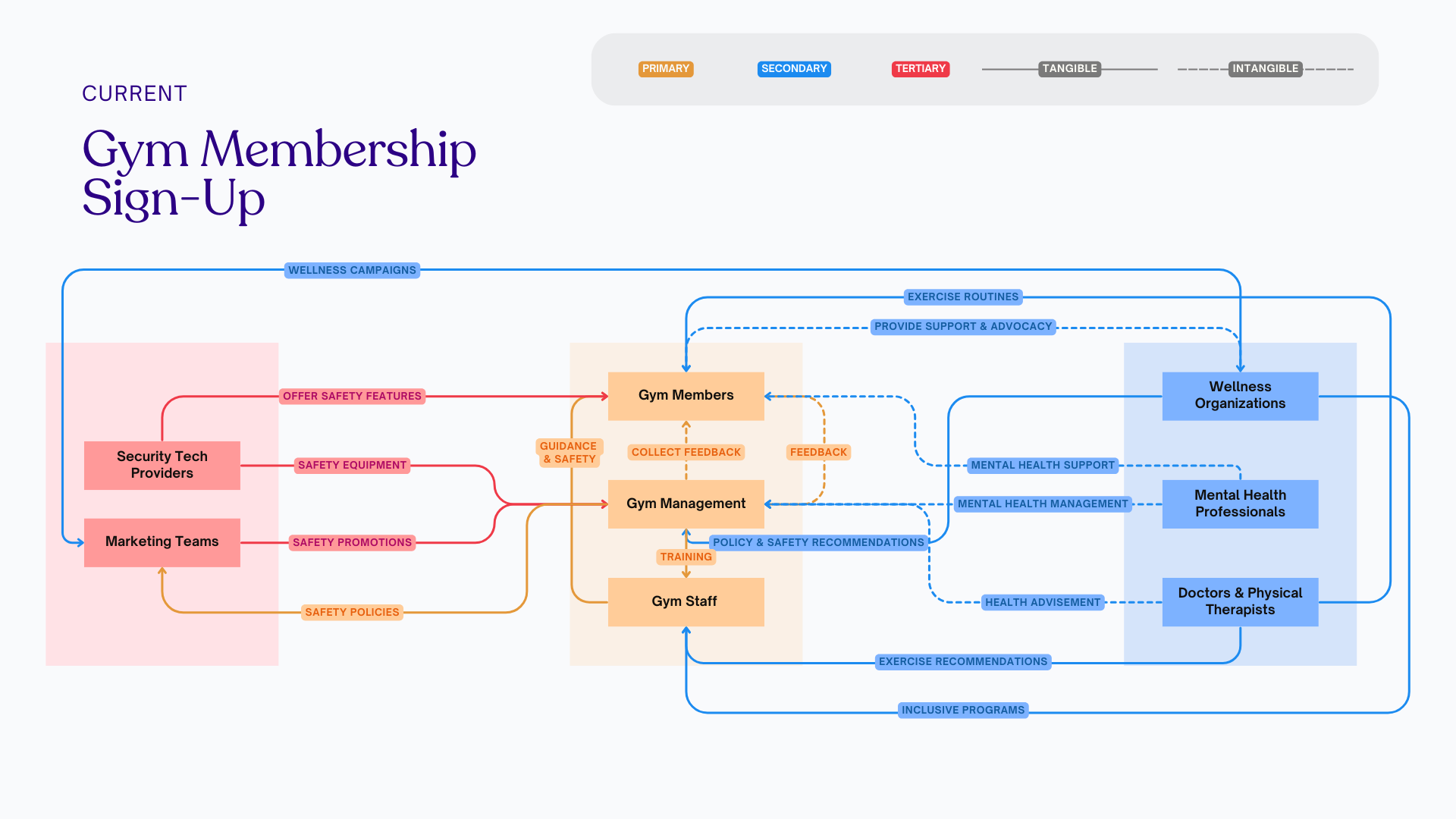
Alpha Fit: Creating a more personalized & holistic fitness experience
This project focuses on creating a more inclusive and supportive gym experience by reducing intimidation and empowering users with personalized guidance. Many beginners feel unsafe or uncertain due to a lack of knowledge, structured onboarding, and accessible trainer support, leading to dropouts and reinforcing fitness inequality. By providing clear navigation, adaptive workout plans, and a strong support system, this service helps users build confidence, take control of their fitness journey, and stay engaged long-term.
CLIENT
Savannah College of Art and Design
DURATION
January-March 2025
ROLE
Project Manager, Service Designer
IMPACT AREA
Promoting Sustainable Food Solutions through Technology
Problem Statement
The lack of structured guidance, clear etiquette, and a supportive gym culture creates intimidation and discouragement, especially for beginners. Unclear equipment instructions, fear of judgment, and unwanted attention lead to anxiety, self-consciousness, and gym dropouts.
Key Insight
How might we create a more supportive and intuitive gym experience that helps beginners feel confident, informed, and motivated from day one?
Alpha Fit is a personalized fitness support service that reduces gym intimidation through structured onboarding, adaptive workout plans, and real-time trainer feedback—helping users feel confident, supported, and in control of their fitness journey.
Understanding the Fitness Environment
The ecosystem map helped us understand the full landscape surrounding a gym-goer’s experience—from digital platforms and physical environments to trainers and peers. It revealed key disconnects between support systems, showing that while trainers and online resources play a critical role, users often struggled to navigate them effectively. It also highlighted a lack of visible guidance and clarity around gym norms, which left many beginners relying on external sources for confidence and information.
Mapping the First-Time Gym Experience
The customer journey map uncovered the emotional highs and lows of a new member’s fitness experience, especially during onboarding and first visits. We found that early motivation can be easily disrupted by unclear guidance or lack of support, while proactive trainer interactions significantly improved user confidence. Users preferred a hybrid approach—structured digital guidance paired with real-life encouragement—and needed consistent, personalized touchpoints to build trust and maintain motivation.
Prototyping and Testing
Evaluating the Experience Across Touchpoints
We conducted multi-touchpoint testing to evaluate how AlphaFit’s service performs at various stages of the gym journey, from sign-up to workout execution. By testing prototypes in both digital (mobile app) and physical (gym staff, gym environment) contexts, we assessed the desirability and usability of key interactions. This process involved simulating real-world gym scenarios, where we observed users engaging with onboarding flows, trainer interactions, and workout routines. The goal was to ensure each touchpoint was intuitive, empowering, and supportive.
Gathering Insights Through Testing
Using a mix of theatrical, conversational, and hi-fi wireframe prototypes, we collected valuable feedback through direct observation and follow-up interviews. These insights helped us identify pain points and areas for improvement across both digital and in-gym experiences. We focused on understanding how users navigated the sign-up process, engaged with trainers, and felt during their workouts. This testing approach allowed us to refine the design, ensuring AlphaFit fosters confidence, accessibility, and engagement at every step of the user's journey.
Through our testing, we learned that the gym onboarding and sign-up process can be enhanced by clearly outlining experience levels, offering more gym etiquette tips, and introducing a first-day assistant feature to guide new users. For the gym workout experience, it became clear that users needed more transparency regarding trainer availability and the ability to adapt trainer assistance to their individual needs. Additionally, ensuring that workout plans are customizable not only based on fitness goals but also on lifestyle factors, such as time constraints or physical limitations, would significantly improve user satisfaction and engagement.









